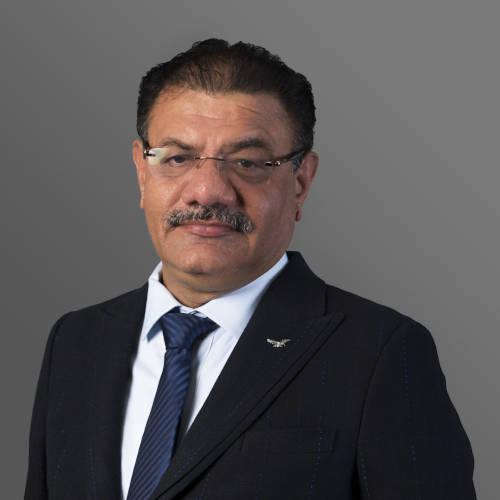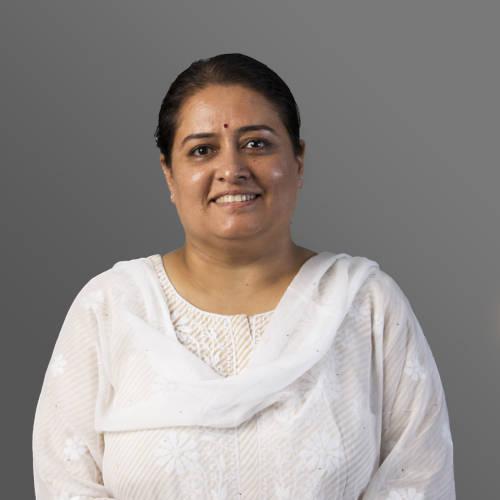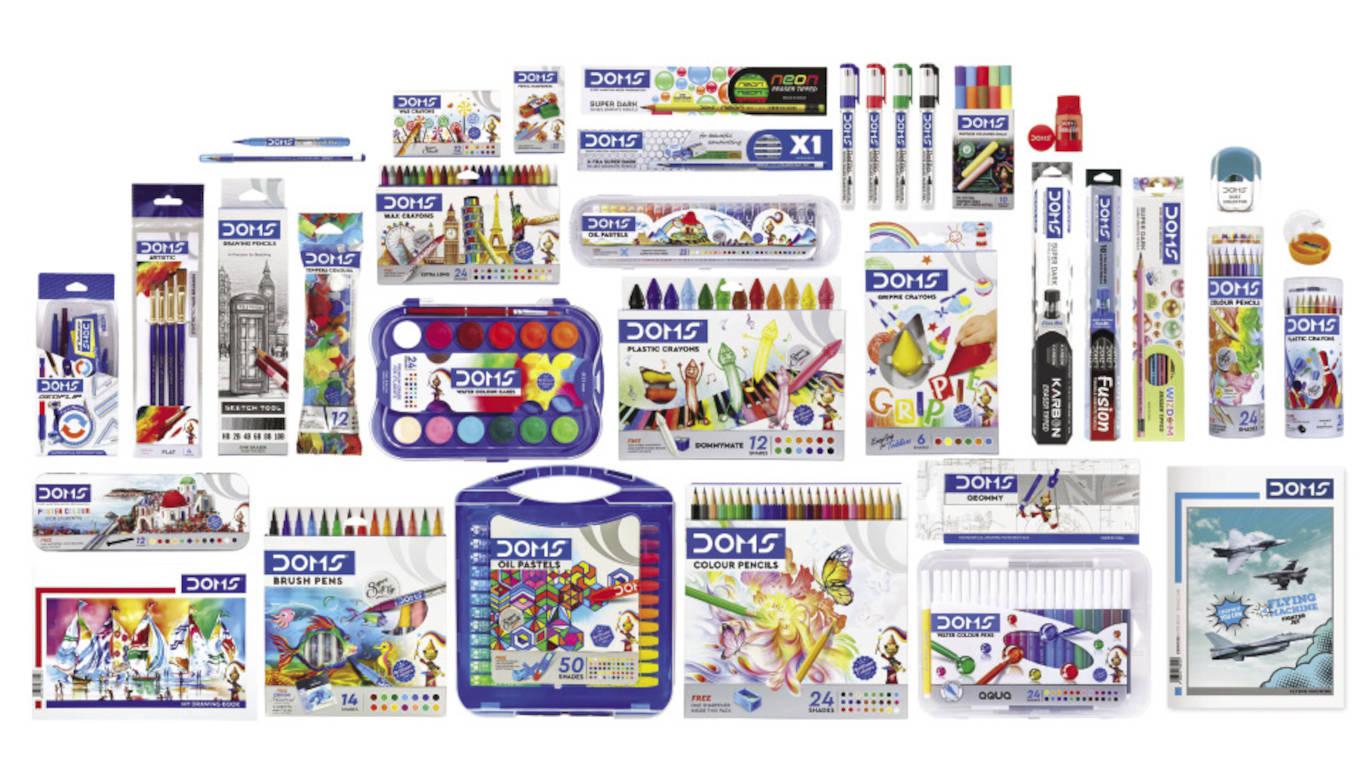-

DOMS' state-of-the-art facility
Only a few survived
In the 70s dozens of pencil-makers existed. Some of the large ones included Hindustan Pencils, Camlin, Lion Pencils and Rabbit Pencils. Hindustan Pencils, set up in 1958, had established brands such as Apsara and Natraj which are still strong more than six decades later. Camlin, which was started by the Dandekar Brothers in the 1930s, had Camel Ink and the Camlin brand for stationery.
Branding was an expensive proposition and RR Pencils decided to concentrate on offering quality products. They decided to take the OEM route and supply pencils to leading Indian brands like Camlin and others. The turnover was a few lakhs. Lead for the pencils was sourced from a company in Ahmedabad and wood was procured from Kerala and other places.
While the turnover in the initial phases was in the lakhs, the company’s strategy was successful. Though quite a few pencil-makers shut shop, RR Pencils survived and continued to grow. “We did not spend on advertisement and marketing even then,” says Santosh Raveshia.
“We allow our products to do the marketing. Our biggest learning comes from our customers. We listen to them. Their requirements help us zero down on new products.” This helped the company to grow from being just a pencil manufacturer to a maker of colouring pencils, non-wood pencils, clay, compass boxes, drawing instruments, crayons, paper stationery and more.
Pencils today contribute to just 35 per cent of the top line. “Our focus on quality and going in for polymer products really differentiates us from the rest. We aim to offer global products at Indian prices,” he adds. The company’s products are priced modestly to suit the student pocket. Faber Castell started making polymer pencils less than a decade ago. Many are still sticking to the traditional wood.
The bulk of the profits since the beginning was ploughed into the company and this helped. RR Pencils soon morphed into Write Fine Pencils Private Limited in the early 90s. Its focus on quality helped it to get into the manufacture of polymer pencils. It was ahead of its time. Today, the group is the largest polymer pencil-maker, globally. Write Fine took over the lead manufacturing company based in Ahmedabad as a part of its backward integration initiative.
Backward integration has also helped the company in trimming costs. Besides the lead unit, the company took over Pioneer Stationery, a company which manufactures notebooks, colouring books, scrap books, craft books and project books – this gave them an entry point to schools. These were sold under the brand C3.
-

Sanjay Rajani: expanding the business
Following the poor health of his father, Santosh Raveshia, 46, was called to Umbergaon. Raveshia, who was schooled in Mumbai, completed his higher studies at the Central Institute of Plastics Engineering and Technology in Ahmedabad.
For two years he had taken up a job with Kissan Ketchup and gained valuable experience in distribution. Santosh’s father was ambitious and was already working on creating his own brand for the company’s products. While the plan was being finalised in 2001, Santosh’s parents died in a car accident. This forced Santosh Raveshia to take charge. With the blessings of his uncle, as Suresh Rajani was fondly called, several initiatives were taken.
Amongst them a key one involved the consolidation of all businesses under Write Fine Pencils Pvt Ltd. Buoyed by his experience in distribution, Suresh Raveshia was instrumental in replacing the private label with its own distribution network under the new brand DOMS with the muppet, Dommy, as its new mascot. The mascot, born in 2006, appealed to kids.
A new company, DOMS Industries replaced Write Fine and housed all businesses of the group in this company. Initially, DOMs was launched in the South with just pencils, erasers and sharpeners. This was tried on a pilot basis in South India. The success of these products saw expansion across categories under the DOMS brand.
Family bond helps
Each member of the family took on the responsibility to grow the various segments of the company. Sanjay Rajani, son of the founding partner, looks at growing the arts business. Known as the silent person in the family he concentrates on expanding the business. Ketan Rajani has taken charge of sourcing wood for the company.
He heads the DOMS unit in J&K, one of its 15 production units. The Kashmir Poplar tree is a good source for pencils with the wood remaining soft in the middle. “We source wood and convert it into slats (which are then cut to insert lead or graphite and sealed to form a raw pencil), before sending them to Umbergaon. At least one-fourth of the slats are sent to the Umbergaon factory. The other slats come from Kerala and other places.”
Poplars are trees normally grown on the borders of farms in J&K. They attain their full height in 6-8 years. With the growing demand for paper as also making boxes (due to its light weight), poplar farms have also come up in several districts. With prices varying from time to time many people have started growing poplars in a bid to supplement their main income.
-

Chandni Somaiya: growth is in our DNA
Besides growing the domestic market, efforts were made to grow globally. Santosh Raveshia was good at negotiations and striking supply alliances to secure long term contracts for boosting exports. It was a chance meeting with a senior member of FILA (Fabbrica Italiana Lapis ed Affini) an Italian stationery group at an industrial exhibition in Germany that laid the ground for a deep-rooted partnership.
For a year both tested the waters. DOMS supplied pencils riding on FILA’s network spanning 150 countries. FILA took a minority stake of 18.5 per cent in December 2011 for €5.4 million. It had an option to increase its stake to 50 per cent later. DOMS requires funds to grow and markets to supply its ever-expanding product portfolio.
“Growth is in our DNA. We are young and want to ensure that DOMS becomes a global name in non-wood pencils,” says Chandni Somaiya. In 2015, as against the original option to take the stake to 50 per cent, FILA which had in the meantime got listed on the Italian Stock Exchange, wanted to add the Indian company’s figures to the consolidated figures of its annual report. It took a 32.5 per cent stake at around €32 million, valuing the company at R740 crore. According to insiders the company continues to run as a joint venture with none of the family members willing to sell any further stake.
Covering all price points
Having beefed up the distribution system, in 2016 DOMS took the strategic stake of 35 per cent in Uniwrite Pens & Plastics Pvt Ltd. This company produces writing pens, pricing them in the medium range. The rationale was to cover all price points. Today, the company has 1,000 channel partners and 3,000 distributors based across the key markets of Ahmedabad, Surat, Rajkot and Mumbai, amongst others.
Being a private limited company, DOMS Industries is reluctant to share actual figures. However as per industry sources, in 2022 it was by far the largest stationery company in India with an estimated turnover of Rs700 crore, exceeding the other two competitors Hindustan Pencils and Kokuyo Camlin (at around Rs548 crore). However, the figures are not strictly comparable as in FY22 the return to normalcy across schools and institutions was not uniform.
-

Ketan Rajani: sourcing wood
For DOMS the last decade has been one of its best periods. The company has grown at a CAGR of ~20 per cent between FY13 and FY22. It has been able to achieve an impressive operational profit margin of upwards of 11 per cent on a higher turnover. The current upswing in business post the pandemic is, according to insiders, expected to see the company to reach sales of Rs1,000 crore in FY23, a near 60 per cent growth (compared to the pre-Covid levels of FY20).
The company follows a judicious model in a bid to conserve cash. 70 per cent of its sales are on the cash and carry model while the rest is sold on credit ranging between 7-15 days. The debt-to-equity ratio is 0.23.
In its pursuit of growth, the company is exploring all adjacent segments. Modelling clay for children as well as adhesives to supplement school gum bottles are being explored. “We are looking to leverage our existing strength in products and distribution to explore newer areas,” says Rahul Shah, group CFO. These could be office stationery, liquid glue, paper, books and stationery. Given the breadth of its existing portfolio, the company may well double itself by 2030.
-

Santosh Raveshia: We have to keep on changing to remain relevant
Making a global brand
Santosh Raveshia, MD, DOMS Industries Private Limited speaks about the growth plans
What is the goal you have set for DOMS over the next decade?
Our goal has not changed. We want to make DOMS the preferred brand across India. We would also like to be the biggest non-wood pencil producers globally.
How do you see the work-from-home syndrome in the post Covid period impacting your sales?
We have to keep on changing to remain relevant. We invest in R&D to offer products which the customer wants. While WFH will see people using more stationery at home, our products primarily cater to kids. We want to provide kids with global standard products at Indian prices. Today, pencils account for just 35 per cent of the topline. Others like crayons, colouring pencils, instruments, modelling clay, art material are all growing.
Are you open to growth through M&A?
Each of the companies has been taken over as the result of a well thought out strategy of growth. We plough the bulk of the profits back into the business. If the opportunity does arise, we will look at takeovers with an open mind.
Why did you sell 51 per cent stake to a foreign company?
In 2011, when we started the discussion, we knew that FILA was a company with good brands and a desire to become a world leader. We wanted new technologies and funds to invest in R&D to make our production more robust. We needed finance to scale up production. Without technology and funds, it may well have been difficult to survive. We wanted to build an organisation. Both FILA and ourselves consider this as a joint venture and not a subsidiary. While both of us have equal representation on the board, the entire operation is being conducted by DOMs independently.
What is one differentiating factor here?
It is a family organisation guided by the philosophy of making products which exceed the expectations of our consumers.







































